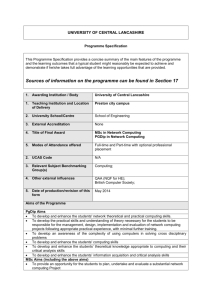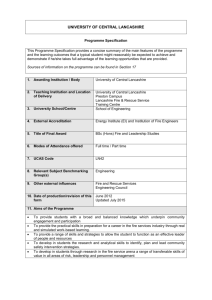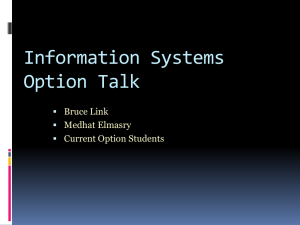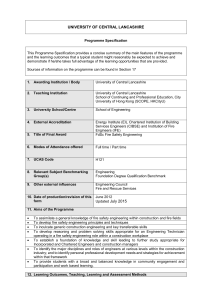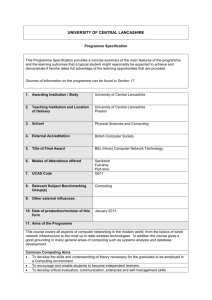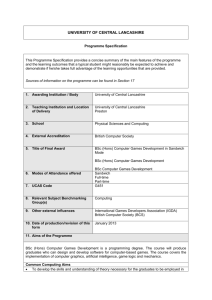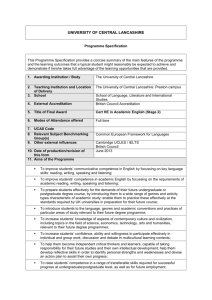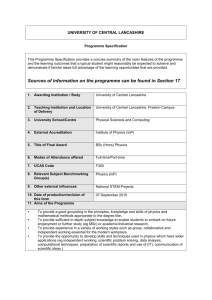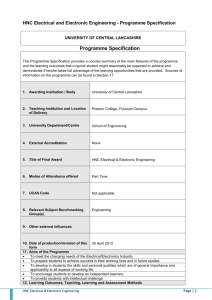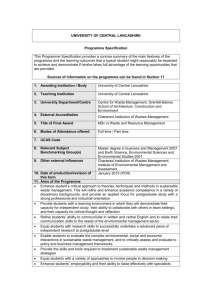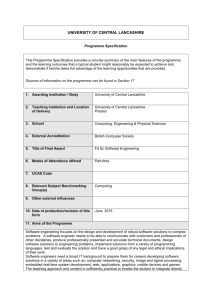fda_accounting_and_financial_studies
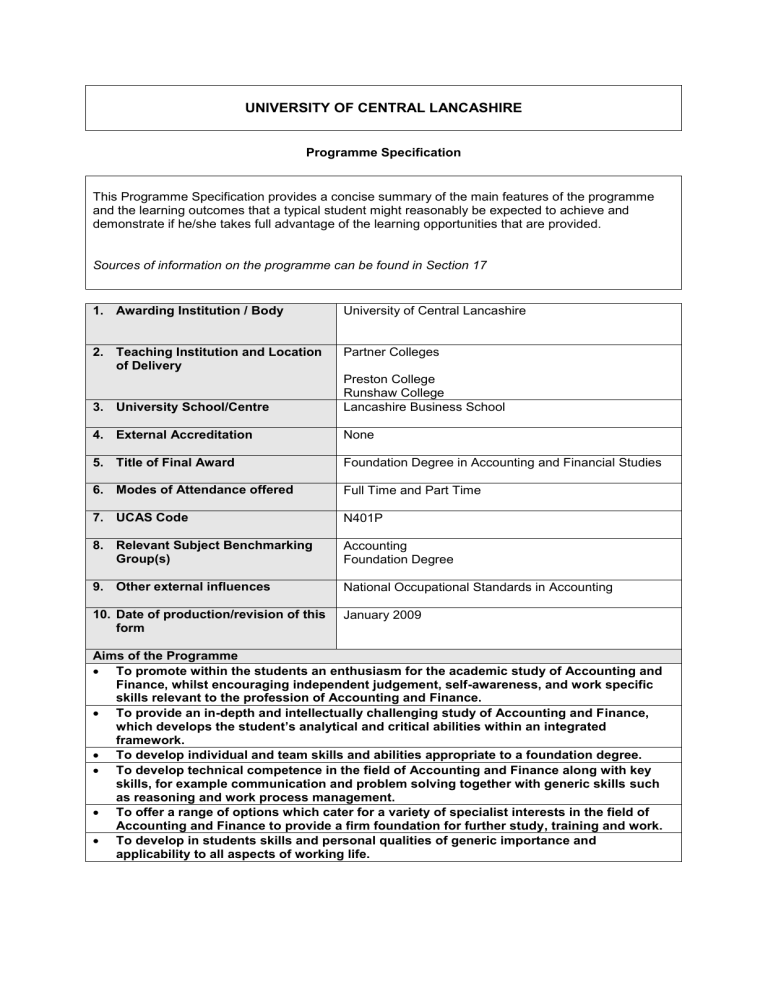
UNIVERSITY OF CENTRAL LANCASHIRE
Programme Specification
This Programme Specification provides a concise summary of the main features of the programme and the learning outcomes that a typical student might reasonably be expected to achieve and demonstrate if he/she takes full advantage of the learning opportunities that are provided.
Sources of information on the programme can be found in Section 17
1. Awarding Institution / Body
2. Teaching Institution and Location of Delivery
3. University School/Centre
4. External Accreditation
5. Title of Final Award
University of Central Lancashire
Partner Colleges
Preston College
Runshaw College
Lancashire Business School
None
Foundation Degree in Accounting and Financial Studies
6. Modes of Attendance offered
7. UCAS Code
8. Relevant Subject Benchmarking
Group(s)
9. Other external influences
10. Date of production/revision of this form
Full Time and Part Time
N401P
Accounting
Foundation Degree
National Occupational Standards in Accounting
January 2009
Aims of the Programme
To promote within the students an enthusiasm for the academic study of Accounting and
Finance, whilst encouraging independent judgement, self-awareness, and work specific skills relevant to the profession of Accounting and Finance.
To provide an in-depth and intellectually challenging study of Accounting and Finance, which develops the student’s analytical and critical abilities within an integrated framework.
To develop individual and team skills and abilities appropriate to a foundation degree.
To develop technical competence in the field of Accounting and Finance along with key skills, for example communication and problem solving together with generic skills such as reasoning and work process management.
To offer a range of options which cater for a variety of specialist interests in the field of
Accounting and Finance to provide a firm foundation for further study, training and work.
To develop in students skills and personal qualities of generic importance and applicability to all aspects of working life.
11. Learning Outcomes, Teaching, Learning and Assessment Methods
A. Knowledge and Understanding
A1. An ability to analyse financial and organisational problems logically.
A2. An ability to apply relevant knowledge and techniques rationally.
A3. An ability to construct and evaluate proposed solutions effectively.
A4. An ability to demonstrate an understanding of the economic, legal and social environment in which the subject of Accounting and Finance operates.
Teaching and Learning Methods
There will be a blend of lectures and practical work undertaken in workshops and seminars; in student centred discussion and in the an alysis of case material and the consideration of ‘real’ business accounting and finance problems.
Assessment methods
The outcomes A1-A4 are assessed by coursework and examination. Coursework include essays, business reports, quizzes, practical group work, and seminar presentations
B. Subject-specific skills
B1. An ability to prepare financial statements for external use.
B2. An ability to analyse and evaluate financial and related business information in various formats.
B3. An ability to prepare and evaluate management accounting information
B4. An ability to incorporate appropriate information technology.
Teaching and Learning Methods
There will be some lectures but the majority of the time spent developing Subject-specific Skills will be in practical workshops and seminars; in student centred discussion and in the analysis of case material and the consideration of ‘real’ business accounting and finance problems.
Assessment methods
The outcomes B1-B4 are assessed by coursework and examinations. Coursework includes essays, business reports, quizzes, practical group work and seminar presentations.
C. Thinking Skills
On completion of the programme students will be able to
C1. Select, collate, analyse and synthesise information from a range of sources.
C2. Interpret and evaluate theoretical concepts
C3. Relate theory to practical applications
Teaching and Learning Methods
There will be some lectures but the majority of the time spent developing Subject-specific Skills will be in practical workshops and seminars; in student centred discussion and in the analysis of case material and the consideration of ‘real’ business accounting and finance problems.
Assessment methods
The outcomes C1-C3 are assessed by coursework and examinations. Coursework includes essays, business reports, quizzes, practical group work and seminar presentations
D. Other skills relevant to employability and personal development
On completion of the programme students will be able to:
D1. Demonstrate an enhanced level of key skills appropriate to making an effective contribution to working in their chosen area of the Accounting and Finance professions. Key skills include:
Communication: taking part in discussions, making presentations, reading and responding to written material
Information Technology: preparation of information processing and presenting information and reviewing the use of technology
Numeracy: collecting and recording data, working with data and presentation of results.
Applying financial and related business skills to personal and business financial situations
Working with others: planning activities with others, working towards identified targets
Improving own learning performance: setting targets and planning action, following a plan to meet targets.
D2. Demonstrate a broad range of skills appropriate to making an effective contribution to working in their chosen area of business
Teaching and Learning Methods
There will be some lectures but the majority of the time spent developing Employability and Personal
Development Skills will be in practical workshops and seminars; in student centred discussion and in the analysis of case material and the consideration of ‘real’ business accounting and finance problems.
Assessment methods
The skills associated with outcome D1 are assessed by coursework and examinations. Coursework includes essays, business reports, quizzes, practical group work and seminar presentations
14. Awards and Credits* 13. Programme Structures*
Level Module
Code
Module Title Credit rating
20 Level 2 AC2100
AC2200
AC2500
AC2410
AC2650
AC2011
Financial Accounting
Management Accounting
Accounting Information
Systems and Control Issues
Finance for Managers
Introduction to Financial
Services Markets
Learning from Work
20
20
20
20
20
Foundation Degree.
Requires 240 credits including a minimum of 100 at Level 2 or above.
Level 1 AC1100
AC1200
MG1009
AC1300
LA 1511
AC1013
EC1009
Introduction to Financial
Accounting
Introduction to Management
Accounting
Fundamentals of Business
Mathematics
Information Systems and the Business Environment
Legal Obligations in
Business
Academic and Professional
Skills
Foundation Economics
20
20
20
20
20
10
10
Exit Award: Foundation
Certificate
Requires a minimum of 120 credits at Level 1.
15. Personal Development Planning
The Foundation Degree in Accounting and Financial Studies has formal activities to support
PDP which focus on the Key Skills areas of Communication, Information Technology,
Numeracy, Working with Others and Improving own learning and performance.
Two modules, one in each year of the programme particularly support PDP, these are AC1013
Academic and Professional Skills and AC2011 Learning from Work. AC1013 aims to develop and enhance key skill areas in the context of academic and professional work and AC2011 is a practically focussed module aimed at enabling students to get the best out of workplace experience.
More generically, the nature of the modules and their operation enables students to plan their work throughout the term, the year and the course. Additionally the management of assessments, their preparation and timely submission prepare students for the realities of life after graduation.
In addition to the above, Personal Development Planning will feature throughout all modules with tutors highlighting student’s strengths and areas for development. These will form action points for personal tutorial sessions when students will identify SMART targets in order that personal and career goals can be met
16. Admissions criteria
Programme Specifications include minimum entry requirements, including academic qualifications, together with appropriate experience and skills required for entry to study. These criteria may be expressed as a range rather than a specific grade. Amendments to entry requirements may have been made after these documents were published and you should consult the University’s website for the most up to date information.
Students will be informed of their personal minimum entry criteria in their offer letter.
Entry requirements for Foundation Degree in Accounting and Finance are a minimum of 120 points plus GCSE Maths and English at Grade C or above. Acceptable qualifications include:
A Level pass (to include at least 60 points at A2 level).
Scottish Certificate in Education Higher Grade Passes.
Irish Leaving Certificate Higher Grade Passes
International Baccalaureate
BTEC National Award/Certificate/Diploma
Kitemarked Access Course
Applications from individuals with non-standard qualifications, relevant work or life experience and who can demonstrate the ability to cope with and benefit from degree level studies are welcome. If you have not studied recently you may be required to undertake an Access Programme. For details of those offered by the University please contact Course Enquiries, tel: 01772 892400
17. Key sources of information about the programme
University of Central Lancashire – Main Campus
Nigel Taylor
University Coordinator for Foundation degrees in Business and Accounting and Financial Studies
Greenbank Building
UCLAN
Preston PR1 2HE
UK
Email Admissions@uclan.ac.uk
Should you have any problems obtaining information or application forms please contact Enquiry
Management at:
Tel: +44 (0) 1772 892400
Fax: +44 (0) 1772 894959
Preston College
Fulwood Campus
Preston
PR2 8UR
UK
Email highereducation@preston.ac.uk
Tel: +44 (0) 1772 225000
Fax: +44 90) 1772 225546
Runshaw College
Langdale Road
Leyland
PR5 2DQ
Email: he@runshaw.ac.uk
Tel : 44 (0) 1772 643005
Fax: +44 (0) 1772 642009
18. Curriculum Skills Map
Please tick in the relevant boxes where individual Programme Learning Outcomes are being assessed
Programme Learning Outcomes
Level
Module
Code Module Title
Core (C),
Compulsory
(COMP) or
Option (O)
Knowledge and understanding Subject-specific Skills Thinking Skills
A1 A2 A3 A4 B1 B2 B3 B4 C1 C2 C3
AC2100 Financial Accounting Comp
AC2200 Management Accounting
AC2500
Comp
Accounting Information systems and Control Issues Comp
*
*
*
*
*
*
*
*
*
*
*
*
* *
* *
*
*
*
*
*
*
*
*
*
*
*
*
AC2410 Finance for Managers
AC2650
Introduction to Financial
Service Markets
Comp
Comp
AC2011 Learning from Work
AC1100
Introduction to Financial
Accounting Comp
AC1200
AC1300
Introduction to Management
Accounting Comp
Information Systems and the
Business Environment Comp
AC1013
Academic and Professional
Skills
Comp
Comp
*
*
*
*
*
*
*
*
*
*
*
*
*
*
*
*
*
*
*
*
*
*
*
*
*
*
*
*
*
*
*
*
*
*
*
*
*
*
*
*
*
*
*
*
*
*
*
*
*
*
*
*
*
*
*
*
*
*
*
*
LA1511 Legal Obligations in Business Comp * * * * * * *
MG1009
Fundamentals of Business
Mathematics
EC1009 Foundation Economics
Comp
Comp
*
*
*
*
*
*
*
*
*
* *
*
*
*
*
*
*
*
*
Note: Mapping to other external frameworks, e.g. professional/statutory bodies, will be included within Student Course Handbooks
Other skills relevant to employability and personal development
D1
*
*
*
*
*
*
*
*
*
*
*
*
D2
*
*
*
*
*
*
*
*
*
*
*
*
